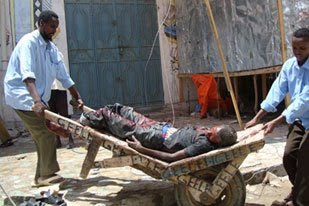 Civilians are bearing the brunt of the violence in Somalia, aid groups say [File: AFP]
Civilians are bearing the brunt of the violence in Somalia, aid groups say [File: AFP]Anti-government fighters fired artillery rounds at the presidential palace from the city's Bakara Market on Monday, prompting guards at the hilltop compund to return fire.
Witnesses said three soldiers were killed at the palace, while a dozen civilians died in the streets below. Abdinasir Said, a Bakara shopkeeper, said he saw six people blown to pieces by a mortar bomb that detonated in the market.
"We have been carrying the injured ones to safety after the shelling stopped," he said. Another man was killed in the market. Nearby, residents said a woman, her three children and a family friend were killed when another mortar bomb crashed onto their home. The barrages are the latest example of violence in Mogadishu that has displaced some 37,000 people in recent weeks, swelling an internal refugee population of 1.1 million, non-governmental organisations (NGOs) said on Monday. More than 50 NGOs issued a statement expressing concern about the "devastating humanitarian crisis" and "horrendous" violence in the country. Also on Monday, a roadside bomb hit a UN car in the town of Merka, located in the Lower Shabelle region, killing its Somali driver and wounding an Italian UN employee, a UN security source said.More suffering
Aid workers say the world is shrugging its shoulders at yet more suffering in Somalia, which has been mired in civil conflict since the 1991 fall of a dictator. "Nearly half of Somalia's population, or 3.25 million people, are now in need of emergency aid. This is a 77 per cent increase since the beginning of 2008," the NGOs said. "This number has increased dramatically over the past year due to the destructive combination of extreme insecurity, drought and record-high food prices. The situation is expected to deteriorate further with ordinary Somalis bearing the brunt." UN-led efforts to broker peace have not brought any lessening of violence "that continues to have a horrendous impact on civilians," they said. "In the last few weeks, renewed shelling in Mogadishu has displaced approximately 37,000 civilians from their homes. Over the past nine months, 870,000 have fled for their lives. A total of 1.1 million people are currently displaced in Somalia today."


